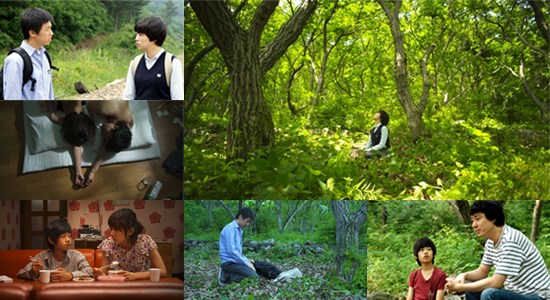
Written by Hayley Scanlon on 04 Dec 2015
Distributor N/A • Certificate N/A • Price N/A
Lee Kwang-kuk’s meta romantic comedy drama first got a London outing at the BFI film festival back in 2012, but now makes a welcome return visit as part of the 2015 Korean film festival in a strand dedicated to its director. Playing alongside a short film, Hard to Say which was completed by Lee in-between Romance Joe and his new film A Matter of Interpretation, the film brings Lee’s meta concerns to the fore and offers plenty of Alice in Wonderland inspired absurdity to its otherwise straightforward plot elements.
Romance Joe is a film with many levels. On the first layer, we have an elderly couple arriving in Seoul to look for their son, who came to the city to be a director 18 years ago but he’s not been in contact recently so they’re worried. His friend greets them and tells them their son had been feeling depressed lately over the suicide of a well-known actress. He then starts to tell them about an idea for a screenplay he’s had about a director with writer’s block who checks into a motel where he’s told another set of stories by a prostitute who delivers coffee as a cover. From here the stories radiate out like cracks in a broken mirror, though we never quite get the answers we’ve been looking for.
Lee has worked extensively with Korean auteur Hong Sang-soo and his shadow looms large over the film. From the cutesy title cards to the static camera with occasional creeping zooms and the often unbearably awkward situations, there is certainly a lot of Hong in Lee’s film. However, where Hong takes the same situation and replays it with a different outcome, Lee gives you a set of intersecting stories which spring forth from each other. Lee’s interests are more surreal and metaphysical than Hong’s which are, ostensibly, more naturalistic in feeling than Lee’s almost hyperreal world.
In contrast to Hong’s social comedies, Lee also digs a little darker into the Korean psyche and reveals a strange preoccupation with suicide and abandoned children. The furthest point back in the film deals with the lonely mid-forest suicide attempt of a teenage schoolgirl who’s become a figure of fun thanks to a loudmouth “boyfriend”. Her rescuer may (or may not be) the man we later come to know as Romance Joe. Though the two eventually bond, the story is not an altogether happy one as they’re rushed into fairly adult decisions which neither of them is really ready for.
Later, a young boy who may (or may not) be the child of the high school girl arrives at the “cafe” from which the prostitute operates, looking for his mother who apparently last wrote to him from that address sometime ago and has since disappeared. Later, the prostitute receives a call from her own son safely in the country being cared for by grandparents while his mother earns the money in the city
In many ways it’s a series of sad yet inevitable stories leaping out from inside each other, each more heart rending than the last, though somehow it never becomes as affecting as you’d like it to be. Romance Joe feels like a deliberate experiment in form, or at least a dedication to pushing conventional narrative structures into new and exciting places, but it does so in a way that’s self-consciously about form rather than content so that it never quite takes hold. It wants to discuss time, memories and stories but ends up mostly talking about itself and, in truth, a little too lengthily. Still, Romance Joe does at least manage to offer an intriguing, beautifully filmed and often enjoyable surrealist tale that will have your mind in knots long after you see it.
Romance Joe was screened as part of the 10th London Korean Film Festival in November 2015.
posted by Richard Durrance on 28 Mar 2025
posted by Richard Durrance on 20 Mar 2025
posted by Richard Durrance on 19 Mar 2025
posted by Richard Durrance on 06 Mar 2025
posted by Richard Durrance on 04 Mar 2025
posted by Richard Durrance on 03 Mar 2025
posted by Richard Durrance on 27 Feb 2025
posted by Richard Durrance on 24 Feb 2025